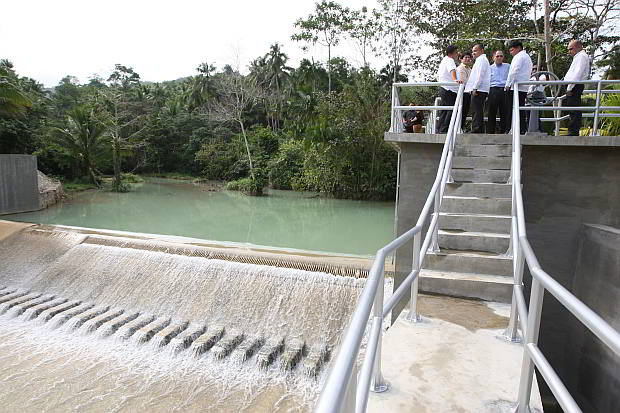
Manila Water Company officials inspect a new weir facility that taps river water in Carmen town . The project will supply at least 18 million liters a day to the Metro Cebu Water District. (CONTRIBUTED PHOTO)
With summer about to kick in and Cebu’ s groundwater supply already thinly stretched, the Metropolitan Cebu Water District (MCWD) is banking on private suppliers to fill the gap.
The water district has resolved to purchase water from the Cebu Bulk Water Supply Project, which taps the Carmen river, where a new weir was built to rechannel the water.
The purchase price is P24.59 per cubic meter.
However, the final cost to end users still has to be decided.
The current cost of producing water is P21 per cubic meter for groundwater. But to the majority of its customers, MCWD’s current rate is P13.60 per cubic meter for those consuming at most 10 cubic meters.
Whether water district managers maintains its subsidy system to ensure water is affordable to households depends on further policy discussion.
The decision to resort to surface water is crucial for Metro Cebu, which relies mainly on pumping ground water from an already strained aquifer to meet a daily water demand of 370,000 cubic meters.
The Cebu Bulk Water Supply project is a joint venture between the Cebu provincial government and the Ayala-led Cebu Manila Water Development Inc. (CMWDI) consortium.
It is set to supply at least 18 million liters of water this year and 35 million liters in the succeeding years from a river in barangay Cantumog, Carmen town, northern Cebu.
The weir and reservoirs in Liloan town are already completeed but Cebu Manila Water Development Inc. is still working on connecting the water from Liloan to reservoirs in Consolacion town where MCWD will connect its pipelines.
Private initiatives
MCWD chairman Rene Mercado said another private bulk water developer, Abejo Waters Corp. is also proposing to supply another 35 million liters sourced from Bonbon, a mountain barangay in Cebu City while another developer is offering to develop a surface water source in barangay Pamutan.
“These are all privately driven initiatives because we have decided, both management and the board, to focus our resources on developing our distribution infrastructure, to build pipelines in order for us to reach those who are in need of water,” Mercado said.
At prseent MCWD serves only 42 percent of total demand in its service area.
The rest of the area doesn’t have piped water, forcing residents to dig wells or buy water from water vendors.
Pilferage
Instead of spending for developing water sources, Mercado said they would rather invest in more distribution pipes and ask private, commercial and industrial companies to source water from MCWD instead of developing their own water system.
Investment of P3 billion to P5 billion is needed for expansion and rehabilitation of distribution lines.
He said MCWD also aims to reduce the average systems loss of 25 percent (water wasted in pipe leaks and pilferage) to 15 percent.
If MCWD is providing 150,000 cubic meters/ day, Mercado said they can save about P 1 million per day if they can rehabilitate leaking pipes and address pilferage.
Limited funds
To meet Cebu’s growing demand, surface water sources have to be tapped.
“Cebu’s economic progress is so fast that the utilities are not able to keep up,” he said.
Water demand in MCWD’s franchise area is 370,000 cubic meters per day but the water district can only supply 205,000 cubic meters per day.
“We have limited funds. To speed up our expansion, we need to invest more on our distribution lines and rely on the private sector to develop surface water. From here on, we will only entertain proposals whose source is surface water,” Mercado said.
Salt water intrusion
There’s a need to build water reservoirs large enough to supply at least 53 million cubic meters a year for Cebu island, he said.
Due to overpumping of groundwater in Cebu, salt water has intruded in the aquifer up to the Capitol area 3.2 kilometers from the eastern coast near the South Road Properties, according to a study by the University of San Carlos—Water Resource Center.
The trend is near impossible to reverse.
“If water seeps inland it will take hundreds of millions of years to move it back to the sea,” said Ronnel Magalso Division Manager-A for MCWD’s Groundwater Division. He spoke during the Water Challenge forum held at the Marco Polo Hotel, last Wednesday.
Water drilling is the cheapest way to get water from the aquifer, but it has not been properly monitored, he said.
Disclaimer: The comments uploaded on this site do not necessarily represent or reflect the views of management and owner of Cebudailynews. We reserve the right to exclude comments that we deem to be inconsistent with our editorial standards.
